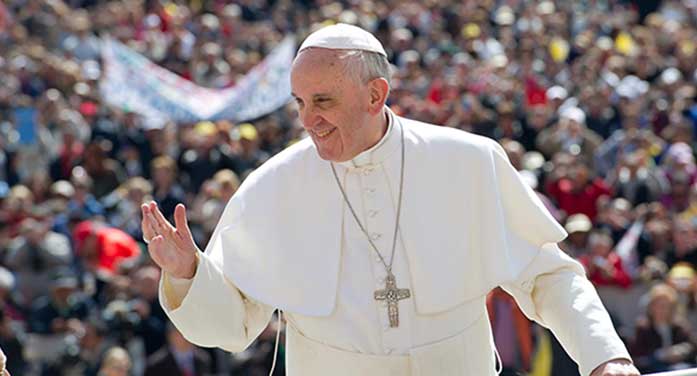 If you’ve a long memory and a thing for American politics, the Vatican’s recent anti-Trump intervention may have rung a bell. Once upon a time, the loyalties of Roman Catholics were deemed suspect, and savvy churchmen learned to be wary of overt partisan involvement lest the fire be inadvertently stoked. Pope Francis seems to have forgotten that lesson.
If you’ve a long memory and a thing for American politics, the Vatican’s recent anti-Trump intervention may have rung a bell. Once upon a time, the loyalties of Roman Catholics were deemed suspect, and savvy churchmen learned to be wary of overt partisan involvement lest the fire be inadvertently stoked. Pope Francis seems to have forgotten that lesson.
Let’s look at some history.
Arguably, 1884’s presidential election was accidentally lost by a Republican preacher’s rhetorical flight against the perceived iniquities of Rum, Romanism and Rebellion. While Reverend Samuel Burchard didn’t intend to tip New York’s 36 electoral votes to the Democrat Grover Cleveland, that’s perhaps what he accomplished. At the end of the piece, Cleveland won New York by a little over a thousand votes out of almost 1.2 million cast there. Without the state, he’d have lost the election.
In addition to showing off his penchant for alliteration, Burchard’s slogan was a derogatory allusion to components of the Democratic base. Rum referred to those opposed to the temperance movement. Romanism was about the Protestant antipathy towards Catholics, prompted by the perceived political threat posed by the Vatican. And Rebellion had to do with the recent Confederate proclivities of southern whites.
But tipplers, Catholics and southerners also voted. And in a close-as-could-be election, New York City’s strategically situated concentration of offended Irish Catholics tilted the balance to the Democrats.
However, even though the anti-Catholic ploy didn’t work in 1884, the religious issue didn’t go away. In 1928, Democrat Al Smith – an anti-prohibition Catholic from New York – was overwhelmingly beaten by Republican Herbert Hoover. Notwithstanding a strong gubernatorial reputation, Smith only carried eight states.
Realistically, Smith’s overwhelming loss can’t be entirely ascribed to religion, but his Catholicism was an explicit issue. For instance, a September 1928 statement from the National Lutheran Editors’ and Managers’ Association warned that, based on its historical track record, the Catholic Church was inherently hostile to the principle of separation of church and state. Thus, as a faithful Catholic, Smith would be conscience-bound to follow the directives of the Vatican.
So, in the aftermath of Smith’s defeat, the idea that no Catholic could be elected president was elevated to conventional wisdom. It remained there until John F. Kennedy’s successful 1960 campaign.
Despite opposition from some advisers, including his father, Kennedy understood the need to tackle the issue directly. Speaking to the Greater Houston Ministerial Association in September 1960, he declared his belief “in an America where the separation of church and state is absolute.”
And he went further, adding this: “I am not the Catholic candidate for President, I am the Democratic Party’s candidate for President who happens also to be a Catholic. I do not speak for my church on public matters – and the church does not speak for me.”
Of course, ever the shrewd politician, Kennedy also nodded to local Texan iconography: “Side by side with Bowie and Crockett died McCafferty and Bailey and Carey, but no one knows whether they were Catholics or not. For there was no religious test at the Alamo.”
As Kennedy successfully worked to relieve Protestant fears, he had help from the Catholic hierarchy, up to and including the Vatican. Put simply, they generally stayed out of the political fray, shunning anything that looked like overtly partisan activity. When Cardinal Spellman hosted the annual Al Smith memorial dinner at New York’s Waldorf-Astoria just weeks before the election, his top table guests included both Kennedy and his Republican opponent, Richard Nixon.
Subsequently, the role of Catholics in American public life became relatively non-controversial. Indeed, hardly anyone noticed that both vice-presidential nominees in 2012 were Catholic, as are two of this year’s Republican presidential candidates – Marco Rubio by birth and Jeb Bush by conversion. However cack-handed Pope Francis may have been, there’s no sign of that benign situation changing.
Mind you, the occasion did demonstrate the modern BBC’s sometime cluelessness on religion. Weighing-in in advance of the South Carolina vote, one report surmised that the intensely religious character of the state’s Republican electorate meant that the papal intervention must be a worry to Trump.
But given the specific nature of South Carolina’s religiosity, that analysis was peculiarly oblivious. After all, evangelical Protestants are hardly likely to take political instruction from Rome. And they didn’t.
Pat Murphy casts a history buff’s eye at the goings-on in our world. Never cynical – well perhaps a little bit.
The views, opinions and positions expressed by columnists and contributors are the author’s alone. They do not inherently or expressly reflect the views, opinions and/or positions of our publication.


